Contemporary Hospitality Industry Analysis: Starwood Hotels Report
VerifiedAdded on 2020/10/22
|8
|1978
|444
Report
AI Summary
This report provides a comprehensive analysis of the contemporary hospitality industry, using Starwood Hotels as a case study. It begins with an introduction to the hospitality sector and its rapid growth, followed by a PESTLE analysis to assess the political, economic, social, technological, environmental, and legal factors impacting the industry. A SWOT analysis is then conducted to evaluate Starwood Hotels' strengths, weaknesses, opportunities, and threats, considering factors like customer preferences, competition, and market trends. The report also examines current and potential trends, such as lifestyle changes, the impact of social media, and sustainability practices. The analysis concludes by emphasizing the importance of external and internal factors, as well as adapting to changing trends for sustained success within the hospitality marketplace. The report also provides references to support the analysis.
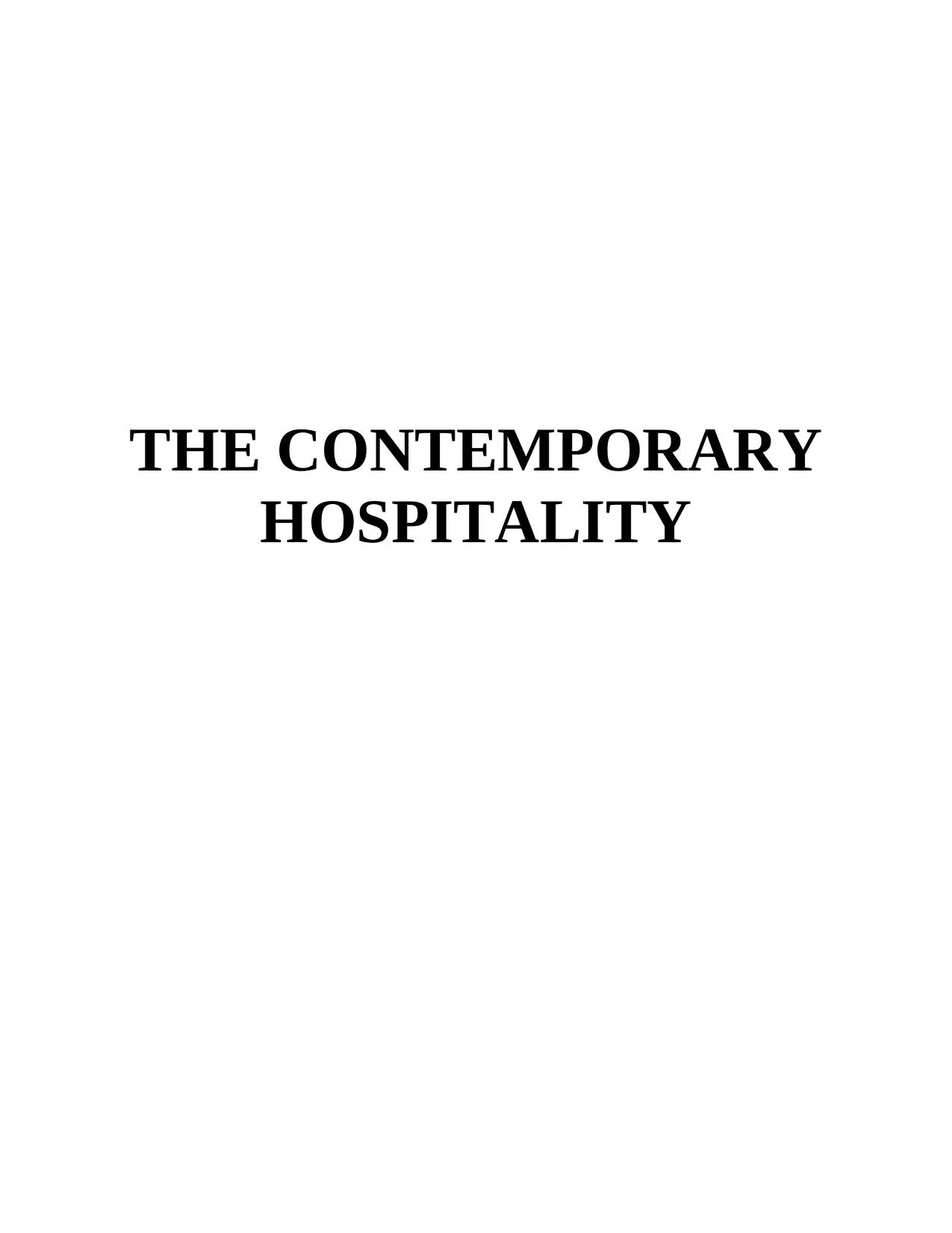
THE CONTEMPORARY
HOSPITALITY
HOSPITALITY
Paraphrase This Document
Need a fresh take? Get an instant paraphrase of this document with our AI Paraphraser
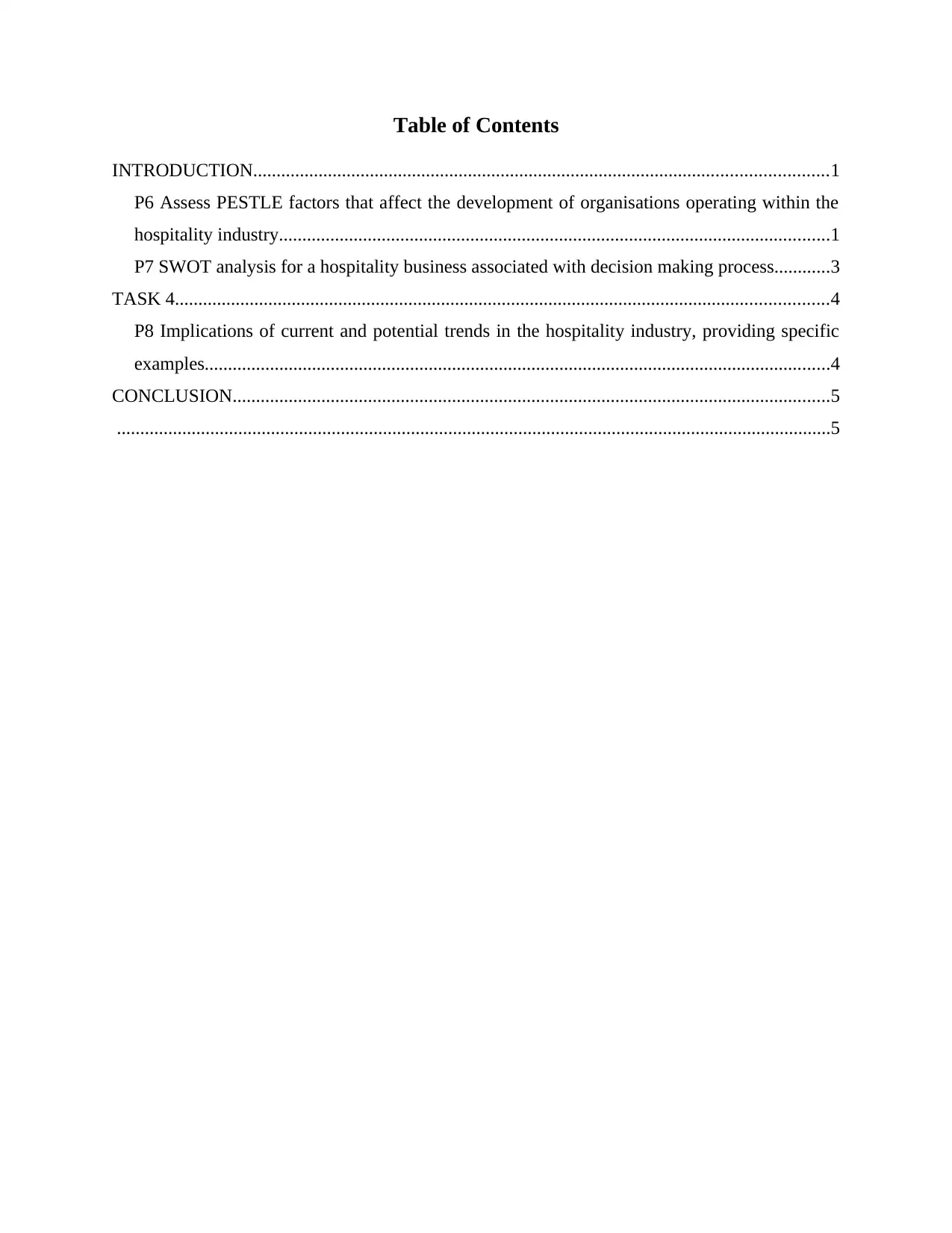
Table of Contents
INTRODUCTION...........................................................................................................................1
P6 Assess PESTLE factors that affect the development of organisations operating within the
hospitality industry......................................................................................................................1
P7 SWOT analysis for a hospitality business associated with decision making process............3
TASK 4............................................................................................................................................4
P8 Implications of current and potential trends in the hospitality industry, providing specific
examples......................................................................................................................................4
CONCLUSION................................................................................................................................5
.........................................................................................................................................................5
INTRODUCTION...........................................................................................................................1
P6 Assess PESTLE factors that affect the development of organisations operating within the
hospitality industry......................................................................................................................1
P7 SWOT analysis for a hospitality business associated with decision making process............3
TASK 4............................................................................................................................................4
P8 Implications of current and potential trends in the hospitality industry, providing specific
examples......................................................................................................................................4
CONCLUSION................................................................................................................................5
.........................................................................................................................................................5
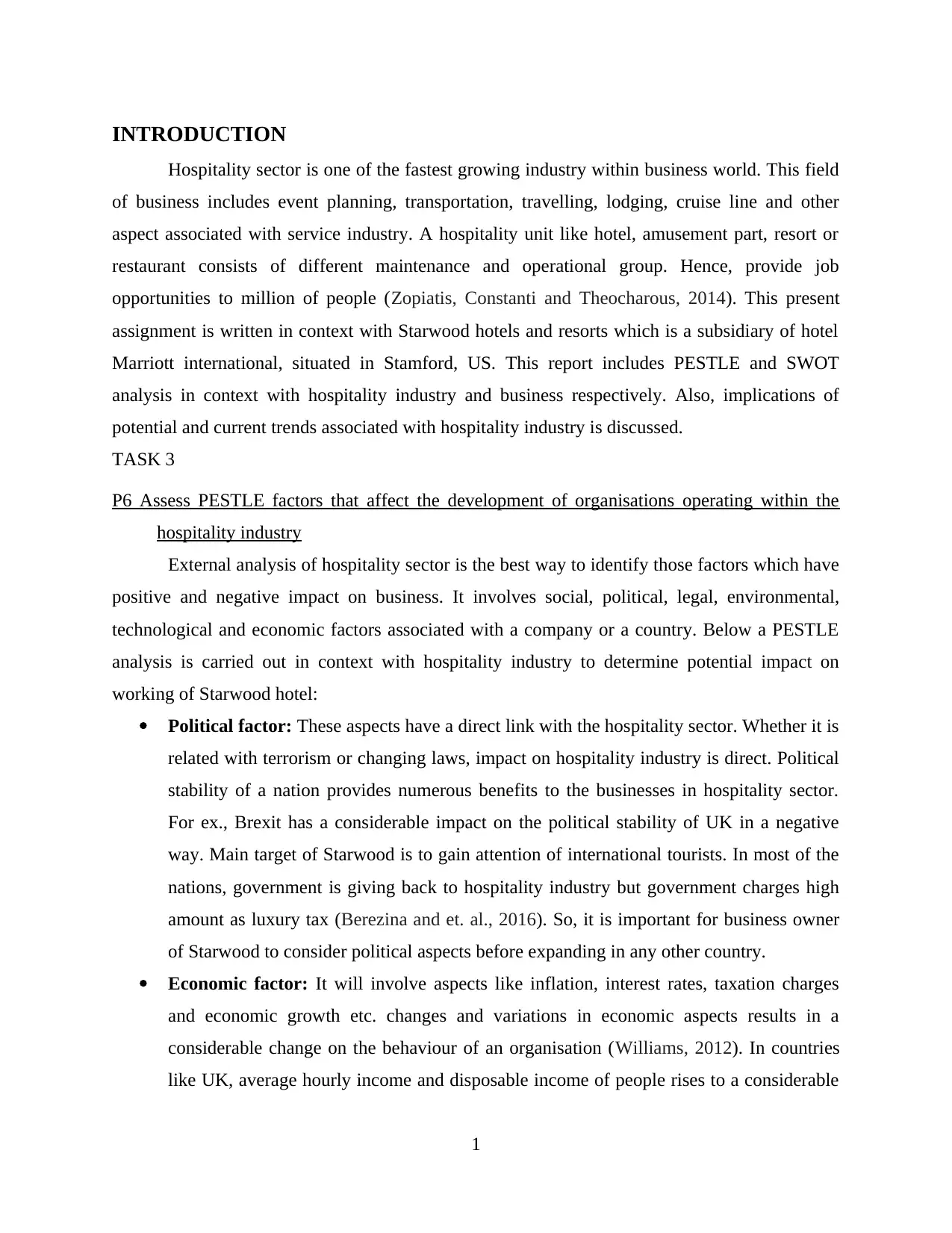
INTRODUCTION
Hospitality sector is one of the fastest growing industry within business world. This field
of business includes event planning, transportation, travelling, lodging, cruise line and other
aspect associated with service industry. A hospitality unit like hotel, amusement part, resort or
restaurant consists of different maintenance and operational group. Hence, provide job
opportunities to million of people (Zopiatis, Constanti and Theocharous, 2014). This present
assignment is written in context with Starwood hotels and resorts which is a subsidiary of hotel
Marriott international, situated in Stamford, US. This report includes PESTLE and SWOT
analysis in context with hospitality industry and business respectively. Also, implications of
potential and current trends associated with hospitality industry is discussed.
TASK 3
P6 Assess PESTLE factors that affect the development of organisations operating within the
hospitality industry
External analysis of hospitality sector is the best way to identify those factors which have
positive and negative impact on business. It involves social, political, legal, environmental,
technological and economic factors associated with a company or a country. Below a PESTLE
analysis is carried out in context with hospitality industry to determine potential impact on
working of Starwood hotel:
Political factor: These aspects have a direct link with the hospitality sector. Whether it is
related with terrorism or changing laws, impact on hospitality industry is direct. Political
stability of a nation provides numerous benefits to the businesses in hospitality sector.
For ex., Brexit has a considerable impact on the political stability of UK in a negative
way. Main target of Starwood is to gain attention of international tourists. In most of the
nations, government is giving back to hospitality industry but government charges high
amount as luxury tax (Berezina and et. al., 2016). So, it is important for business owner
of Starwood to consider political aspects before expanding in any other country.
Economic factor: It will involve aspects like inflation, interest rates, taxation charges
and economic growth etc. changes and variations in economic aspects results in a
considerable change on the behaviour of an organisation (Williams, 2012). In countries
like UK, average hourly income and disposable income of people rises to a considerable
1
Hospitality sector is one of the fastest growing industry within business world. This field
of business includes event planning, transportation, travelling, lodging, cruise line and other
aspect associated with service industry. A hospitality unit like hotel, amusement part, resort or
restaurant consists of different maintenance and operational group. Hence, provide job
opportunities to million of people (Zopiatis, Constanti and Theocharous, 2014). This present
assignment is written in context with Starwood hotels and resorts which is a subsidiary of hotel
Marriott international, situated in Stamford, US. This report includes PESTLE and SWOT
analysis in context with hospitality industry and business respectively. Also, implications of
potential and current trends associated with hospitality industry is discussed.
TASK 3
P6 Assess PESTLE factors that affect the development of organisations operating within the
hospitality industry
External analysis of hospitality sector is the best way to identify those factors which have
positive and negative impact on business. It involves social, political, legal, environmental,
technological and economic factors associated with a company or a country. Below a PESTLE
analysis is carried out in context with hospitality industry to determine potential impact on
working of Starwood hotel:
Political factor: These aspects have a direct link with the hospitality sector. Whether it is
related with terrorism or changing laws, impact on hospitality industry is direct. Political
stability of a nation provides numerous benefits to the businesses in hospitality sector.
For ex., Brexit has a considerable impact on the political stability of UK in a negative
way. Main target of Starwood is to gain attention of international tourists. In most of the
nations, government is giving back to hospitality industry but government charges high
amount as luxury tax (Berezina and et. al., 2016). So, it is important for business owner
of Starwood to consider political aspects before expanding in any other country.
Economic factor: It will involve aspects like inflation, interest rates, taxation charges
and economic growth etc. changes and variations in economic aspects results in a
considerable change on the behaviour of an organisation (Williams, 2012). In countries
like UK, average hourly income and disposable income of people rises to a considerable
1
⊘ This is a preview!⊘
Do you want full access?
Subscribe today to unlock all pages.

Trusted by 1+ million students worldwide
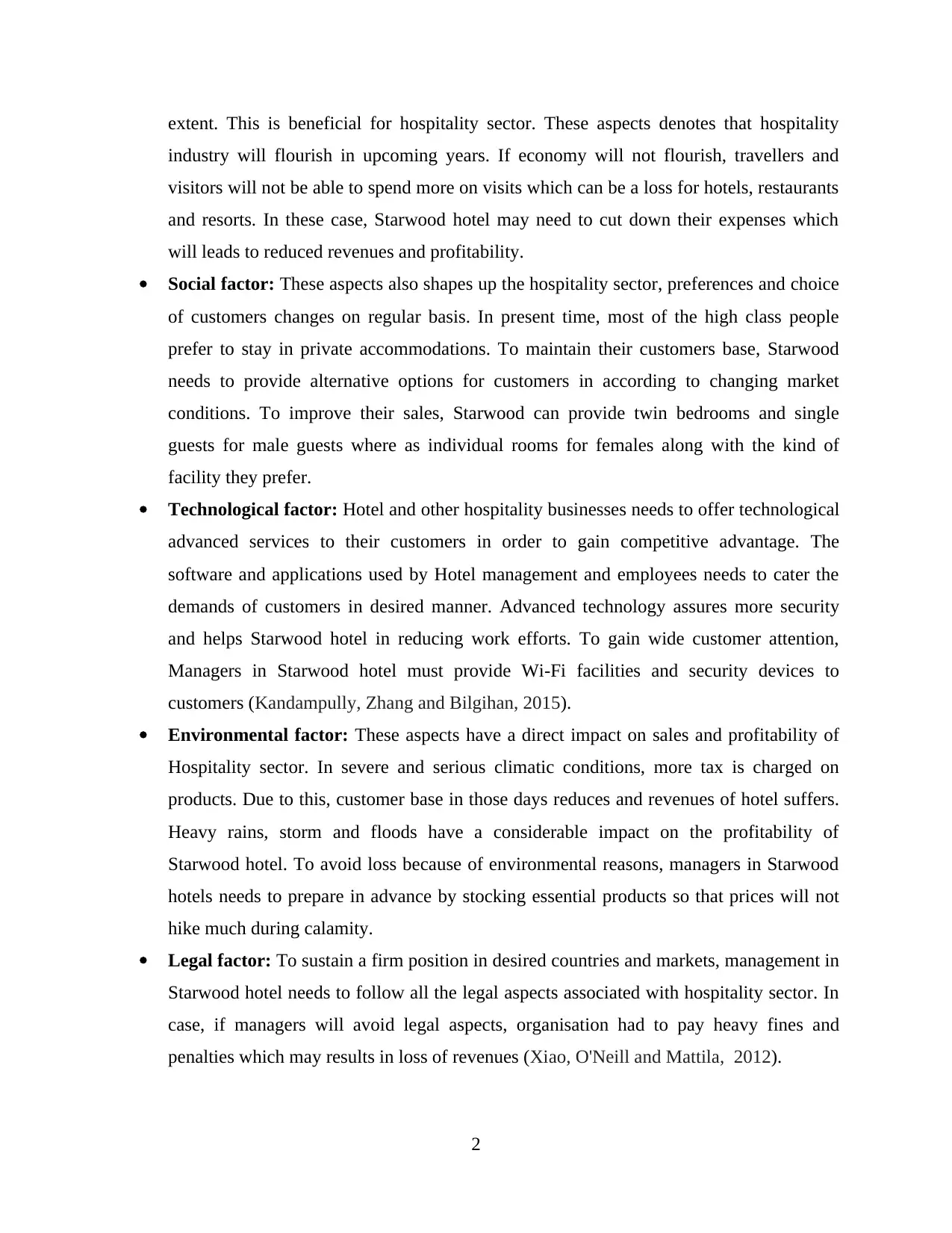
extent. This is beneficial for hospitality sector. These aspects denotes that hospitality
industry will flourish in upcoming years. If economy will not flourish, travellers and
visitors will not be able to spend more on visits which can be a loss for hotels, restaurants
and resorts. In these case, Starwood hotel may need to cut down their expenses which
will leads to reduced revenues and profitability.
Social factor: These aspects also shapes up the hospitality sector, preferences and choice
of customers changes on regular basis. In present time, most of the high class people
prefer to stay in private accommodations. To maintain their customers base, Starwood
needs to provide alternative options for customers in according to changing market
conditions. To improve their sales, Starwood can provide twin bedrooms and single
guests for male guests where as individual rooms for females along with the kind of
facility they prefer.
Technological factor: Hotel and other hospitality businesses needs to offer technological
advanced services to their customers in order to gain competitive advantage. The
software and applications used by Hotel management and employees needs to cater the
demands of customers in desired manner. Advanced technology assures more security
and helps Starwood hotel in reducing work efforts. To gain wide customer attention,
Managers in Starwood hotel must provide Wi-Fi facilities and security devices to
customers (Kandampully, Zhang and Bilgihan, 2015).
Environmental factor: These aspects have a direct impact on sales and profitability of
Hospitality sector. In severe and serious climatic conditions, more tax is charged on
products. Due to this, customer base in those days reduces and revenues of hotel suffers.
Heavy rains, storm and floods have a considerable impact on the profitability of
Starwood hotel. To avoid loss because of environmental reasons, managers in Starwood
hotels needs to prepare in advance by stocking essential products so that prices will not
hike much during calamity.
Legal factor: To sustain a firm position in desired countries and markets, management in
Starwood hotel needs to follow all the legal aspects associated with hospitality sector. In
case, if managers will avoid legal aspects, organisation had to pay heavy fines and
penalties which may results in loss of revenues (Xiao, O'Neill and Mattila, 2012).
2
industry will flourish in upcoming years. If economy will not flourish, travellers and
visitors will not be able to spend more on visits which can be a loss for hotels, restaurants
and resorts. In these case, Starwood hotel may need to cut down their expenses which
will leads to reduced revenues and profitability.
Social factor: These aspects also shapes up the hospitality sector, preferences and choice
of customers changes on regular basis. In present time, most of the high class people
prefer to stay in private accommodations. To maintain their customers base, Starwood
needs to provide alternative options for customers in according to changing market
conditions. To improve their sales, Starwood can provide twin bedrooms and single
guests for male guests where as individual rooms for females along with the kind of
facility they prefer.
Technological factor: Hotel and other hospitality businesses needs to offer technological
advanced services to their customers in order to gain competitive advantage. The
software and applications used by Hotel management and employees needs to cater the
demands of customers in desired manner. Advanced technology assures more security
and helps Starwood hotel in reducing work efforts. To gain wide customer attention,
Managers in Starwood hotel must provide Wi-Fi facilities and security devices to
customers (Kandampully, Zhang and Bilgihan, 2015).
Environmental factor: These aspects have a direct impact on sales and profitability of
Hospitality sector. In severe and serious climatic conditions, more tax is charged on
products. Due to this, customer base in those days reduces and revenues of hotel suffers.
Heavy rains, storm and floods have a considerable impact on the profitability of
Starwood hotel. To avoid loss because of environmental reasons, managers in Starwood
hotels needs to prepare in advance by stocking essential products so that prices will not
hike much during calamity.
Legal factor: To sustain a firm position in desired countries and markets, management in
Starwood hotel needs to follow all the legal aspects associated with hospitality sector. In
case, if managers will avoid legal aspects, organisation had to pay heavy fines and
penalties which may results in loss of revenues (Xiao, O'Neill and Mattila, 2012).
2
Paraphrase This Document
Need a fresh take? Get an instant paraphrase of this document with our AI Paraphraser
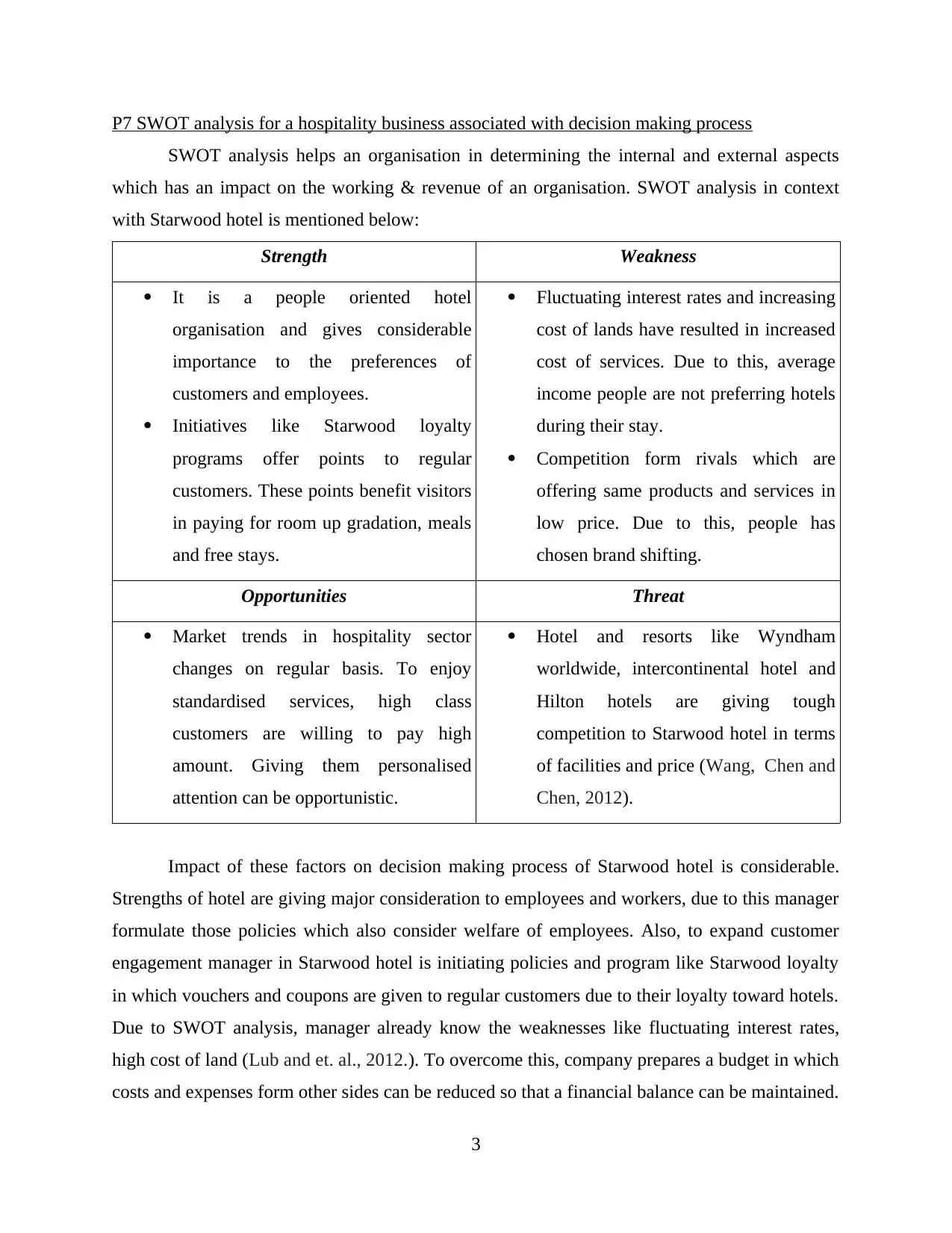
P7 SWOT analysis for a hospitality business associated with decision making process
SWOT analysis helps an organisation in determining the internal and external aspects
which has an impact on the working & revenue of an organisation. SWOT analysis in context
with Starwood hotel is mentioned below:
Strength Weakness
It is a people oriented hotel
organisation and gives considerable
importance to the preferences of
customers and employees.
Initiatives like Starwood loyalty
programs offer points to regular
customers. These points benefit visitors
in paying for room up gradation, meals
and free stays.
Fluctuating interest rates and increasing
cost of lands have resulted in increased
cost of services. Due to this, average
income people are not preferring hotels
during their stay.
Competition form rivals which are
offering same products and services in
low price. Due to this, people has
chosen brand shifting.
Opportunities Threat
Market trends in hospitality sector
changes on regular basis. To enjoy
standardised services, high class
customers are willing to pay high
amount. Giving them personalised
attention can be opportunistic.
Hotel and resorts like Wyndham
worldwide, intercontinental hotel and
Hilton hotels are giving tough
competition to Starwood hotel in terms
of facilities and price (Wang, Chen and
Chen, 2012).
Impact of these factors on decision making process of Starwood hotel is considerable.
Strengths of hotel are giving major consideration to employees and workers, due to this manager
formulate those policies which also consider welfare of employees. Also, to expand customer
engagement manager in Starwood hotel is initiating policies and program like Starwood loyalty
in which vouchers and coupons are given to regular customers due to their loyalty toward hotels.
Due to SWOT analysis, manager already know the weaknesses like fluctuating interest rates,
high cost of land (Lub and et. al., 2012.). To overcome this, company prepares a budget in which
costs and expenses form other sides can be reduced so that a financial balance can be maintained.
3
SWOT analysis helps an organisation in determining the internal and external aspects
which has an impact on the working & revenue of an organisation. SWOT analysis in context
with Starwood hotel is mentioned below:
Strength Weakness
It is a people oriented hotel
organisation and gives considerable
importance to the preferences of
customers and employees.
Initiatives like Starwood loyalty
programs offer points to regular
customers. These points benefit visitors
in paying for room up gradation, meals
and free stays.
Fluctuating interest rates and increasing
cost of lands have resulted in increased
cost of services. Due to this, average
income people are not preferring hotels
during their stay.
Competition form rivals which are
offering same products and services in
low price. Due to this, people has
chosen brand shifting.
Opportunities Threat
Market trends in hospitality sector
changes on regular basis. To enjoy
standardised services, high class
customers are willing to pay high
amount. Giving them personalised
attention can be opportunistic.
Hotel and resorts like Wyndham
worldwide, intercontinental hotel and
Hilton hotels are giving tough
competition to Starwood hotel in terms
of facilities and price (Wang, Chen and
Chen, 2012).
Impact of these factors on decision making process of Starwood hotel is considerable.
Strengths of hotel are giving major consideration to employees and workers, due to this manager
formulate those policies which also consider welfare of employees. Also, to expand customer
engagement manager in Starwood hotel is initiating policies and program like Starwood loyalty
in which vouchers and coupons are given to regular customers due to their loyalty toward hotels.
Due to SWOT analysis, manager already know the weaknesses like fluctuating interest rates,
high cost of land (Lub and et. al., 2012.). To overcome this, company prepares a budget in which
costs and expenses form other sides can be reduced so that a financial balance can be maintained.
3
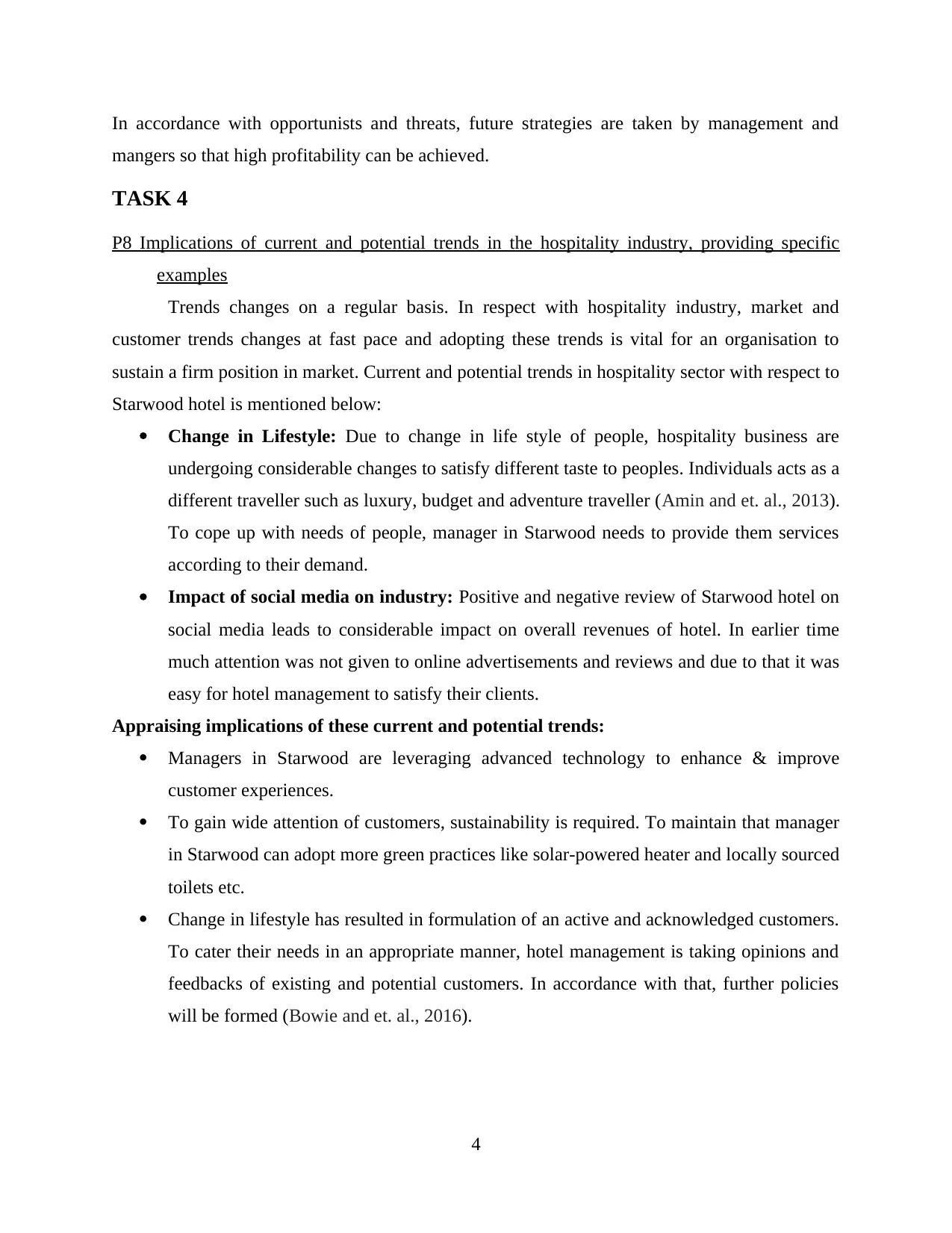
In accordance with opportunists and threats, future strategies are taken by management and
mangers so that high profitability can be achieved.
TASK 4
P8 Implications of current and potential trends in the hospitality industry, providing specific
examples
Trends changes on a regular basis. In respect with hospitality industry, market and
customer trends changes at fast pace and adopting these trends is vital for an organisation to
sustain a firm position in market. Current and potential trends in hospitality sector with respect to
Starwood hotel is mentioned below:
Change in Lifestyle: Due to change in life style of people, hospitality business are
undergoing considerable changes to satisfy different taste to peoples. Individuals acts as a
different traveller such as luxury, budget and adventure traveller (Amin and et. al., 2013).
To cope up with needs of people, manager in Starwood needs to provide them services
according to their demand.
Impact of social media on industry: Positive and negative review of Starwood hotel on
social media leads to considerable impact on overall revenues of hotel. In earlier time
much attention was not given to online advertisements and reviews and due to that it was
easy for hotel management to satisfy their clients.
Appraising implications of these current and potential trends:
Managers in Starwood are leveraging advanced technology to enhance & improve
customer experiences.
To gain wide attention of customers, sustainability is required. To maintain that manager
in Starwood can adopt more green practices like solar-powered heater and locally sourced
toilets etc.
Change in lifestyle has resulted in formulation of an active and acknowledged customers.
To cater their needs in an appropriate manner, hotel management is taking opinions and
feedbacks of existing and potential customers. In accordance with that, further policies
will be formed (Bowie and et. al., 2016).
4
mangers so that high profitability can be achieved.
TASK 4
P8 Implications of current and potential trends in the hospitality industry, providing specific
examples
Trends changes on a regular basis. In respect with hospitality industry, market and
customer trends changes at fast pace and adopting these trends is vital for an organisation to
sustain a firm position in market. Current and potential trends in hospitality sector with respect to
Starwood hotel is mentioned below:
Change in Lifestyle: Due to change in life style of people, hospitality business are
undergoing considerable changes to satisfy different taste to peoples. Individuals acts as a
different traveller such as luxury, budget and adventure traveller (Amin and et. al., 2013).
To cope up with needs of people, manager in Starwood needs to provide them services
according to their demand.
Impact of social media on industry: Positive and negative review of Starwood hotel on
social media leads to considerable impact on overall revenues of hotel. In earlier time
much attention was not given to online advertisements and reviews and due to that it was
easy for hotel management to satisfy their clients.
Appraising implications of these current and potential trends:
Managers in Starwood are leveraging advanced technology to enhance & improve
customer experiences.
To gain wide attention of customers, sustainability is required. To maintain that manager
in Starwood can adopt more green practices like solar-powered heater and locally sourced
toilets etc.
Change in lifestyle has resulted in formulation of an active and acknowledged customers.
To cater their needs in an appropriate manner, hotel management is taking opinions and
feedbacks of existing and potential customers. In accordance with that, further policies
will be formed (Bowie and et. al., 2016).
4
⊘ This is a preview!⊘
Do you want full access?
Subscribe today to unlock all pages.

Trusted by 1+ million students worldwide
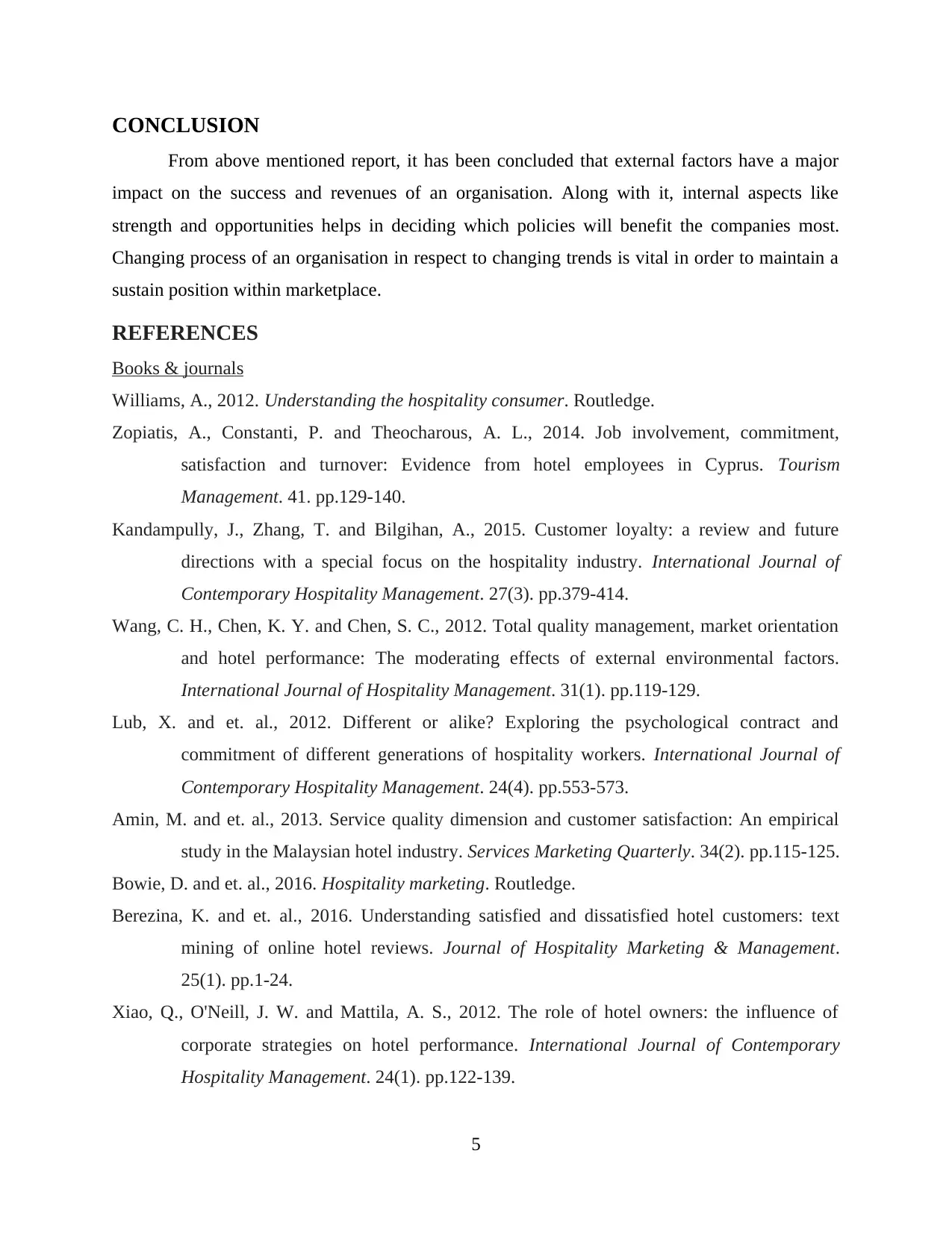
CONCLUSION
From above mentioned report, it has been concluded that external factors have a major
impact on the success and revenues of an organisation. Along with it, internal aspects like
strength and opportunities helps in deciding which policies will benefit the companies most.
Changing process of an organisation in respect to changing trends is vital in order to maintain a
sustain position within marketplace.
REFERENCES
Books & journals
Williams, A., 2012. Understanding the hospitality consumer. Routledge.
Zopiatis, A., Constanti, P. and Theocharous, A. L., 2014. Job involvement, commitment,
satisfaction and turnover: Evidence from hotel employees in Cyprus. Tourism
Management. 41. pp.129-140.
Kandampully, J., Zhang, T. and Bilgihan, A., 2015. Customer loyalty: a review and future
directions with a special focus on the hospitality industry. International Journal of
Contemporary Hospitality Management. 27(3). pp.379-414.
Wang, C. H., Chen, K. Y. and Chen, S. C., 2012. Total quality management, market orientation
and hotel performance: The moderating effects of external environmental factors.
International Journal of Hospitality Management. 31(1). pp.119-129.
Lub, X. and et. al., 2012. Different or alike? Exploring the psychological contract and
commitment of different generations of hospitality workers. International Journal of
Contemporary Hospitality Management. 24(4). pp.553-573.
Amin, M. and et. al., 2013. Service quality dimension and customer satisfaction: An empirical
study in the Malaysian hotel industry. Services Marketing Quarterly. 34(2). pp.115-125.
Bowie, D. and et. al., 2016. Hospitality marketing. Routledge.
Berezina, K. and et. al., 2016. Understanding satisfied and dissatisfied hotel customers: text
mining of online hotel reviews. Journal of Hospitality Marketing & Management.
25(1). pp.1-24.
Xiao, Q., O'Neill, J. W. and Mattila, A. S., 2012. The role of hotel owners: the influence of
corporate strategies on hotel performance. International Journal of Contemporary
Hospitality Management. 24(1). pp.122-139.
5
From above mentioned report, it has been concluded that external factors have a major
impact on the success and revenues of an organisation. Along with it, internal aspects like
strength and opportunities helps in deciding which policies will benefit the companies most.
Changing process of an organisation in respect to changing trends is vital in order to maintain a
sustain position within marketplace.
REFERENCES
Books & journals
Williams, A., 2012. Understanding the hospitality consumer. Routledge.
Zopiatis, A., Constanti, P. and Theocharous, A. L., 2014. Job involvement, commitment,
satisfaction and turnover: Evidence from hotel employees in Cyprus. Tourism
Management. 41. pp.129-140.
Kandampully, J., Zhang, T. and Bilgihan, A., 2015. Customer loyalty: a review and future
directions with a special focus on the hospitality industry. International Journal of
Contemporary Hospitality Management. 27(3). pp.379-414.
Wang, C. H., Chen, K. Y. and Chen, S. C., 2012. Total quality management, market orientation
and hotel performance: The moderating effects of external environmental factors.
International Journal of Hospitality Management. 31(1). pp.119-129.
Lub, X. and et. al., 2012. Different or alike? Exploring the psychological contract and
commitment of different generations of hospitality workers. International Journal of
Contemporary Hospitality Management. 24(4). pp.553-573.
Amin, M. and et. al., 2013. Service quality dimension and customer satisfaction: An empirical
study in the Malaysian hotel industry. Services Marketing Quarterly. 34(2). pp.115-125.
Bowie, D. and et. al., 2016. Hospitality marketing. Routledge.
Berezina, K. and et. al., 2016. Understanding satisfied and dissatisfied hotel customers: text
mining of online hotel reviews. Journal of Hospitality Marketing & Management.
25(1). pp.1-24.
Xiao, Q., O'Neill, J. W. and Mattila, A. S., 2012. The role of hotel owners: the influence of
corporate strategies on hotel performance. International Journal of Contemporary
Hospitality Management. 24(1). pp.122-139.
5
Paraphrase This Document
Need a fresh take? Get an instant paraphrase of this document with our AI Paraphraser

6
1 out of 8
Related Documents
Your All-in-One AI-Powered Toolkit for Academic Success.
+13062052269
info@desklib.com
Available 24*7 on WhatsApp / Email
![[object Object]](/_next/static/media/star-bottom.7253800d.svg)
Unlock your academic potential
Copyright © 2020–2026 A2Z Services. All Rights Reserved. Developed and managed by ZUCOL.





